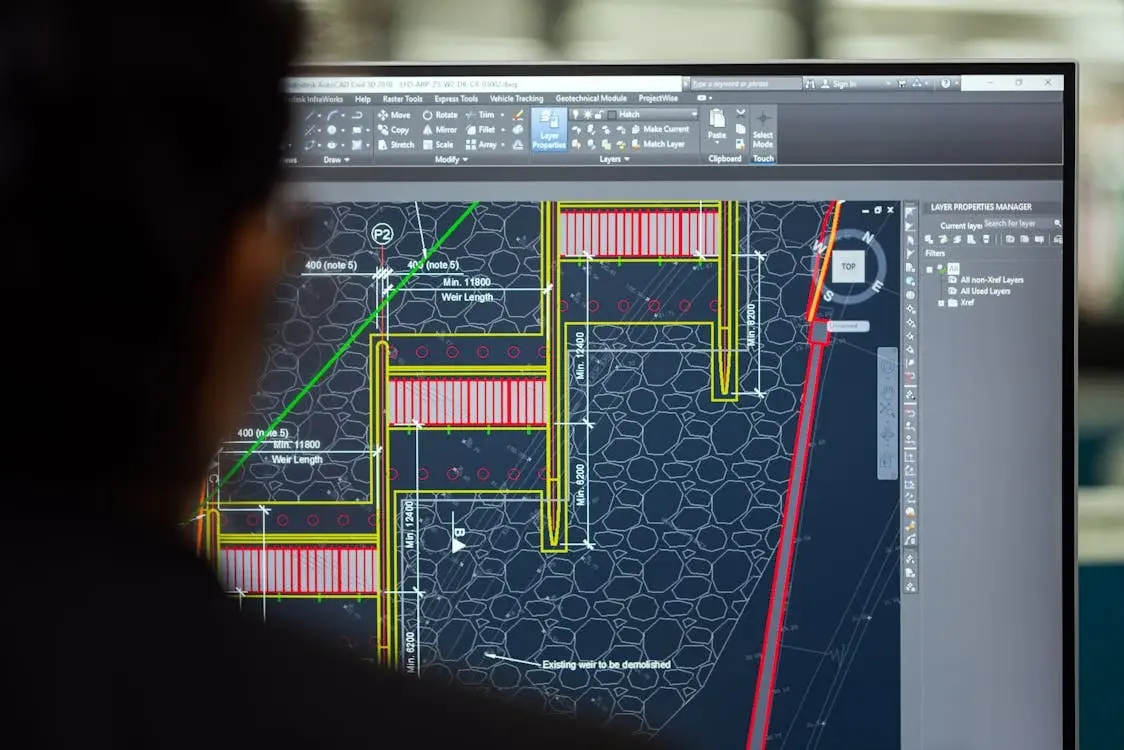
Dreaming of working where most people vacation? Hawaii offers more than breathtaking coastlines and a relaxed living, it’s a place where infrastructure and innovation are combined to come up with designs that leave an impact on the users. With average civil engineer salaries reaching $94,000, the area is in demand for professionals who are skilled in areas such as sustainable design and coastal projects, ready to make an impact.
In this guide, you'll learn all you need to know about civil engineer salaries in Hawaii, comparing city-based pay, growth trends, and key factors that influence earnings. If you’re starting or just looking to level up your career, you’ll get a clear picture of what to expect in 2026.
Average Salary for Civil Engineers in Hawaii 2026
The average base salary for a civil engineer in Hawaii is approximately $78,980 per year, with total compensation reaching around $94,000 annually. These figures show the state's ongoing infrastructure projects and the demand for engineering expertise. In urban centres like Honolulu, salaries tend to be higher; for instance, civil engineers there earn an average base salary of $81,888, with total compensation around $97,931 annually.
Here's a breakdown by experience level:
- Entry-Level Civil Engineers: $76,442 per year
- Mid-Level Civil Engineers (5–8 years): $90,000 to $100,000 annually
- Senior Civil Engineers: $103,309 per year.
Professionals with certifications such as PE (Professional Engineer) or PMP (Project Management Professional) and those with expertise in areas like Building Information Modeling (BIM) or smart city infrastructure often get salaries at the higher end of these ranges.
5 Career Paths of a Civil Engineer in Hawaii
Civil engineering in Hawaii offers a range of specializations, all with different responsibilities and salary ranges:
1. BIM Engineer
BIM professionals use advanced tools, such as AutoCAD Civil 3D, Navisworks, and Revit, to make intelligent 3D models and manage data of infrastructure projects. They usually collaborate across all teams to detect design clashes early, thus reducing costly errors. This makes their expertise highly in demand.
2. Structural Engineer
Structural Engineers ensure the integrity and safety of infrastructure. They play a major role in designing structures that are fit for Hawaii's environmental conditions. Their work is to design bridges, buildings, and frameworks that can resist assessing wind and seismic activity, making their skills important in every construction in Hawaii because of its exposure to hurricanes and volcanic activity.
3. Transportation Engineer
Transportation Engineers focus on the planning and development of transportation systems, crucial for Hawaii's tourism economy. Their projects aim to reduce congestion and improve commuter safety. Tourism as a major economic activity encourages the design of roads, highways, and airports, making this role offer a strong career stability
4. Environmental Engineer
Environmental Engineers ensure sustainable development and compliance with environmental regulations. They are usually involved in preserving natural ecosystems in urban centers in Hawaii since they create systems that help to minimize waste and pollution
5. Geotechnical Engineer
Geotechnical engineers analyze soil and rock properties to ensure the stability of construction projects. Hawaii's different types of terrains help prevent landslides, foundation failures, and structural weaknesses. The volcanic soil causes construction challenges, making this profession paramount in this area.
Average Civil Engineering Salaries Across Other Hawaiian Cities
|
City |
Average annual salary |
|
Honolulu |
|
|
Maui Meadows |
|
|
Kailua-Kona |
|
|
Pearl City |
|
|
East Honolulu |
These figures highlight the regional differences in civil engineering salaries across Hawaii, influenced by factors such as local demand, cost of living, and the scale of infrastructure projects.
Also Read - North Carolina Civil Engineer Salary: Charlotte vs. Raleigh
6 Factors Affecting Civil Engineer Salaries in Hawaii

1. Experience Level
Professionals with more years in the field usually get higher salaries. Senior civil engineers often manage large-scale projects, mentor junior staff, and make decisions, which justifies higher pay. Entry-level engineers may start lower but see rapid increases within the first five years of working.
2. Specialization
Fields like BIM (Building Information Modeling), structural engineering, and transportation engineering often offer higher pay due to their technical nature. These specializations require continuous learning, software proficiency, and hands-on experience with complex systems. Engineers with these skills are in high demand, particularly in projects involving advanced infrastructure or technology integration.
3. Location
Urban areas like Honolulu and Pearl City tend to offer higher salaries compared to rural regions. This is due to the concentration of government contracts, private developers, and engineering consultancies in cities. Living costs are also higher in urban areas, prompting firms to offer more competitive compensation.
4. Education and Certifications
Advanced degrees and certifications, such as a Master’s in Civil Engineering or PE (Professional Engineer) licensure, can significantly boost salary. These credentials demonstrate a higher level of expertise and dedication to the field. Many employers in Hawaii prioritize candidates with formal qualifications when hiring for senior or specialized roles.
5. Industry Demand
Sectors experiencing growth, such as renewable energy, coastal infrastructure, and climate-resilient design, tend to offer higher compensation. Hawaii’s unique environmental challenges and sustainability goals increase the demand for skilled civil engineers in innovative areas.
6. Company Size
Larger firms often have more resources to offer competitive salaries and comprehensive benefits. These companies usually handle bigger projects, which require specialized talent and high levels of accountability. Employees in large organizations may also receive bonuses, relocation packages, or international travel opportunities.
Average Salary in Civil Engineering: 5-Year Trends in Hawaii

Over the past five years, civil engineering salary trends in Hawaii have shown steady growth, influenced by the state’s evolving infrastructure needs, coastal resilience projects, and sustainability-focused initiatives. With Hawaii’s unique geographic and environmental challenges, civil engineers have become vital players in shaping the islands’ future.
- 2019: The average salary of a civil engineer in Hawaii was approximately $83,270. At the time, increased activity in road improvement, seawall construction, and public utilities drove demand for engineering talent, especially in urban centers like Honolulu.
- 2026: Although with the economic effects of the COVID-19 pandemic, the salaries showed a slight increase to around $84,830. Project slowdowns and budget reallocations created temporary uncertainty, particularly for public sector contracts. However, critical infrastructure work remained active, allowing many engineers to retain stable positions.
- 2026: The salaries dipped to $79,180, caused by delayed infrastructure recovery despite economic reopening. Many public sector projects in Hawaii remained paused or underfunded, limiting high-paying opportunities. Companies also leaned toward hiring junior engineers to reduce costs, lowering the overall salary average.
- 2026: The average salary for civil engineers in Hawaii rose to approximately $82,910. Increased investments in renewable energy systems, smart water management, and transportation upgrades created new opportunities for skilled professionals.
- 2026 to 2026: The average salary in civil engineering in Hawaii reached around $100,000, with beginning salary for civil engineers starting at $70,000.
Also Read - Virginia Civil Engineer Salaries in 2026
Boost Your Salary as a Civil Engineer by Mastering BIM
In today’s competitive AEC industry, standing out as a civil engineer requires more than just a degree. Building Information Modeling (BIM) is transforming how infrastructure projects are designed and executed. By mastering BIM, you not only stay relevant but also open doors to higher-paying roles and faster career growth.
The BIM Advantage:
- Civil engineers with BIM skills are very much in demand, earning over 40% more than the rest.
- Better use of BIM boosts efficiency, makes collaboration far simpler, and helps to achieve superior project results.
How Novatr Helps?
Novatr Offers BIM Professional Course for civil and structural engineers, Novatr’s comprehensive program helps you gain BIM expertise in just 7 months. This course helps you learn about information modeling, parametric structure families, preparing drawings and presenting your designs. It also covers 3D modeling, BIM principles for infrastructure and 4D/5D visualization.
The main focus of this program is on real skills, which involve using the cloud, streamlining BIM techniques, working together and locating clashes. It enables you to use Revit, as well as over 12 other leading building information modeling programs, while following practical methods. Upon the completion of the course, you will be eligible for recognition from Autodesk and Novatr, which can improve your job prospects.
Key USPs:
- Get Dual Certification from Autodesk and Novatr
- Learn Essential BIM Workflows
- 40+ hours of live learning with lifelong access to program content, including multiple RIBA & ISO 19650 Capstone projects.
- Mastering Revit and 10+ BIM software, including Autodesk Revit, Navisworks,
- Construction Cloud, Bluebeam, Tekla & Civil 3D with industry workflows in just 7 months.
- 48% Average CTC Hike: Get placement assistance to land BIM jobs in globally operating AEC firms.
- ISO Verified Project Experience: Practice your skills by working on an international, standard-structured project
- Career Guidance and Placement Support: Prepare for success with guided interviews, portfolio building, and LinkedIn optimization.
- Dedicated Mentor Support: Stay on track throughout with quick query resolution and personalized feedback. Learn from global mentors who are a part of the top 1% AEC companies.
- Weekly live sessions for learning, revision, and practice.
- Professionally built in-house digital platform to elevate your learning experience.
Why Choose Novatr?
- Trusted by Thousands: Join 6,000+ BIM learners from over 45 countries who have successfully graduated from Novatr.
- Expert-Driven Curriculum: Designed through the analysis of 1,000+ job descriptions and rigorously vetted by 200+ global BIM experts.
- Globally Recognized Certifications: Earn certifications from both Autodesk and Novatr, showcasing your verified expertise.
- Proven Career Impact: Learners report an average salary hike of 48% after course completion.
- Loved by BIM Learners: We have a 4.6+ average rating across platforms like Google and Trustpilot.
In a rapidly evolving industry, Novatr stands out as the premier choice for civil engineers looking to master BIM. Enroll today to future-proof your career and unlock unparalleled growth opportunities in the AEC sector.
Next Step
The civil engineer salary in Hawaii reflects the state's demand for skilled professionals in infrastructure and development. While the cost of living is higher, the compensation, coupled with the unique lifestyle, makes it an attractive destination for civil engineers. By specializing in areas like BIM Professional Course for Civil Engineers through trusted platforms like Novatr, you can maximize your earning potential and enjoy a fulfilling civil engineering career.
Visit our resource page to explore more resources and expert guidance on advancing your career.
Was this content helpful to you



.jpg)







